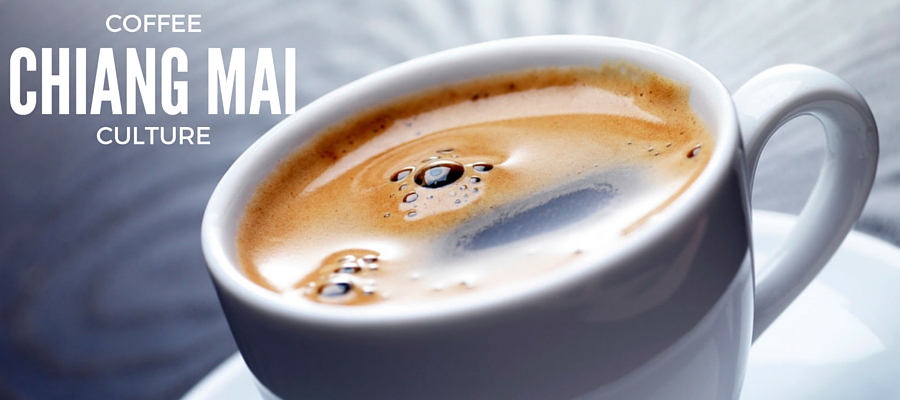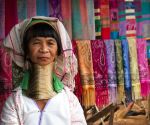Something’s Brewing in Chiang Mai
With 300 plus temples dating back to the thirteenth century, Chiang Mai, Thailand is easily most famous for its ancient history. It may come as a surprise, however, that amidst temple ruins, exotic waterfalls, and tourist attractions this city brews a fine cup of Joe. This fact is especially interesting when considering coffee was not even available in this part of the world until the 17th and 18th century. Originally brought to Thailand by French coffee farmers in Burma, Thailand has since taken over the java business making it a booming success.
Thailand hasn’t always been successful in the coffee industry, though. When the crop was first brought into the country, farmers in Chiang Mai and surrounding areas were still producing opium as their choice crop. Because of this, the coffee beans available at the time, Robusta, were planted in the southern parts of the country to make a quick buck for underprivileged families in the region. However, in 1969, this all changed. When the king of Thailand replaced opium with agricultural crops, farmers in the north took to the arabica coffee bean. Today, Arabica coffee has managed to sustain over 800 families over a 6000-acre growing area. The Chiang Mai region continues to thrive as a result of the crop, providing surrounding villages with electricity, running water, and new schools.

The city of Chiang Mai, because of the many ancient ruins, has become an epicentre for tourism in Thailand and developed into quite a modern city. Taking this and their java success in stride, the surrounding community has developed a unique, eccentric coffee culture that continues to impress travellers and natives alike. Chiang Mai has taken the Arabica brew to the next level. With many clothing, cosmetic, and even tech stores placing cafes inside their place of business, your cup of joe isn’t just for the morning anymore. No, coffee in Chiang Mai has become a staple for even the most mundane activities.
Because of Thailand’s achievement in the coffee industry, the country has birthed whole institutions dedicated to researching and refining their coffee crops. Not only is Thailand doing its research, but it's also enriching its future generations in the art of coffee cultivation. In the region of Chiang Mai, there are schools devoted to teaching students everything there is to know about the countries’ agricultural practices surrounding its coffee growth.
With the plethora of coffee, you’d think getting the good stuff would be a breeze. Unfortunately, this isn’t the case for Thailand, as finding specialty java in the region can actually prove to be a difficult task. Oddly, it may actually be Thailand’s coffee growth that is to blame for this setback. Because the crop is in such high demand, the country actually tends to consume more coffee than it makes. In fact, According to the United States Department of Agriculture, in 2011-2012, ‘Thailand produced around 54 million kilograms of coffee, however, consumed around 62.4 million kilograms. Although it exports 1.9 million kilograms of green coffee.’ As a result, Thailand takes countless efforts to protect its market and all importing affairs are tasked with great importance. Because of this, green coffee beans imported into the country are officially taxed at 90 percent. There is hope that this will change in the near future, though.
Despite the high taxation and great demand for the product, local cafes continue to thrive in Chiang Mai and surrounding areas. Many aren’t just your run of the mill coffee shops, either. Rather has been the growth of eccentric coffee shops that continues to attract tourists and natives alike. What makes these local joints so unique? Many of these cafes are popping up with personalities of their own including a shop modelled after a library and another adorned exclusively in British décor. Don’t worry, though, most coffee shops do tend to provide a little taste of home with fast, reliable, free WiFI to relish in while you enjoy your brew.
Chiang Mai Coffee Shop Map
So, what, exactly, does a cup of Joe from Thailand taste like? Because of the many different strands of Arabica grown in the Northern region of the country, pinpointing one distinct flavour can be pretty difficult. For instance Nacha Coffee, a grower located in Chiang Mai produces a strand of Arabica that tends to be sweeter than other strands of the crop. Because of this, the coffee brewed by Nacha tends to have a flavour that is perfect for dessert coffees, while other strands of Arabica in the area are described to have a spicy or even bitter-sweet flavour.
Another factor to consider when talking about the flavour of Thailand’s coffee is its rich soil. The country as a whole is familiar with a tropical climate. The region of Chiang Mai, however, experiences more mild temperatures and lower humidity levels, giving Chiang Mai a micro-climate perfect for growing world-class coffee. Not only that, but Chiang Mai is surrounded by a ring of mountains that produce natural springs which flow freely through the region dispersing minerals throughout the land. Because of this, the soil in this area has developed a spice-like fragrance that seems to seep into the crops, producing layers of complexity within the beans.
If that isn’t enough, many Thailand farmers are tasked with hand-picking the regions harvest to ensure perfectly ripe beans before processing. During processing, the beans are handled in some pretty untraditional ways. Unlike most agricultural practices that place their coffee crops through several harsh water treatments, Thailand takes pride in gently soaking its beans, then sun drying them to remove the outer layer of pulp. This careful process tends to produce a deeper, more robust flavour for the beans.
Just why hasn’t this coffee made it’s way into the hearts and homes of westernized cultures? Perhaps it’s because Thailand’s delicacy is even so sought after in their own country, that finding it anywhere else in the world is next to impossible! Try searching for the special brew today, and more than likely the search will end with the poor instant coffee substitutes that make java lovers everywhere cringe. That’s right, finding a native Chiang Mai cup of Joe is going to come down to making a trip over to Thailand in person. However, with the beautiful views and tropical climates this may not be such a bad thing!
So what, exactly, makes Thai’s coffee to die for? Beyond the obvious flavour definitions produced by cautious handling and enriched soil, are beans with a story to tell. Not only has the coffee recently made its debut in Thailand within the last few hundred years but has since gone on to create wealth, culture, and a strong community for the people in the Chiang Mai area. All of that, plus the fact that the region is surrounded by a dense history with roots just as deep and complex as a cup of this black-gold, can make any coffee enthusiast weak in the knees. Yes, indeed, something is brewing in Chiang Mai.
Related Articles
- 10 Best Coffee Houses On ‘Coffee Street’, Nimmanhaemin Road
- Discover The Real Chiang Mai
- Chiang Mai Coffee Shop Culture
- Explore Nimman Area in Chiang Mai
- What to Eat in Chiang Mai
AKYRA MANOR CHIANG MAI
22/2 Nimmana Haeminda Road Soi 9,
Su Thep, Muang Chiang Mai District,
Chiang Mai 50200,
Thailand
T : +66 (0) 5 321 6219
M: Location
Others Blog
Latest Post
The Karen Hill Tribes of Chiang Mai
22/04/24Extend Your Stay in Chiang Mai
01/04/24



